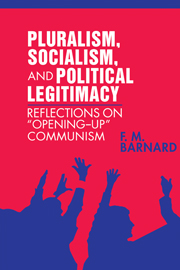Book contents
- Frontmatter
- Contents
- Preface
- 1 Introduction
- 2 The Context
- 3 Socialist pluralism and pluralist socialism
- 4 Ideological differentiation under socialism
- 5 Socialism and the language of sentiment
- 6 Socialism and the language of rationality
- 7 Socialism, politics, and citizenship
- 8 Conclusion
- Appendix: Electoral confrontation under socialism
- Index
6 - Socialism and the language of rationality
Published online by Cambridge University Press: 25 January 2010
- Frontmatter
- Contents
- Preface
- 1 Introduction
- 2 The Context
- 3 Socialist pluralism and pluralist socialism
- 4 Ideological differentiation under socialism
- 5 Socialism and the language of sentiment
- 6 Socialism and the language of rationality
- 7 Socialism, politics, and citizenship
- 8 Conclusion
- Appendix: Electoral confrontation under socialism
- Index
Summary
Disillusionment with the language of community and friendship in Eastern Europe was intriguingly paralleled by Western socialist critics, who, no less forthrightly, repudiated the communitarian rhetoric of nominally socialist regimes, together with the vestiges of the withering-away theory of the state that frequently accompanied it. What was less forthright or unambiguous, I wish to suggest, was the outcome of these efforts in terms of the recovery of a politics of opinion, chiefly, I believe, because they seemingly failed to observe the distinction Czechoslovak pluralists, and most expressly Klokocka, made between epistemic rationality and the rationality of politics.
Rationality and political rationality
Three themes strike me as significant points of departure in the critique of socialist theorists in the West. The first is their taking issue with the idea of man undergoing a total transformation under socialism. The idea is dismissed as a wholly unfounded notion, a “corrupt fantasy,” that is as dangerously misleading as it is misleadingly dangerous. The second major critique of nominally socialist regimes in Eastern Europe, Russia in particular, is their rejection of the claim that rapid industrialization liberated “the masses,” when in fact the liberation was a case of “forced modernization.” Third, and for our purpose most relevantly, the Western socialist critics, like their Eastern counterparts in Czechoslovakia, strove to revitalize the state as a “vital and exciting world” and at the same time to stress that a state, simply by becoming a socialist state, did not cease to be a state. Any attempt to becloud or disguise this fact was debunked as “sheer fatuity.”
- Type
- Chapter
- Information
- Pluralism, Socialism, and Political LegitimacyReflections on Opening up Communism, pp. 103 - 118Publisher: Cambridge University PressPrint publication year: 1992



